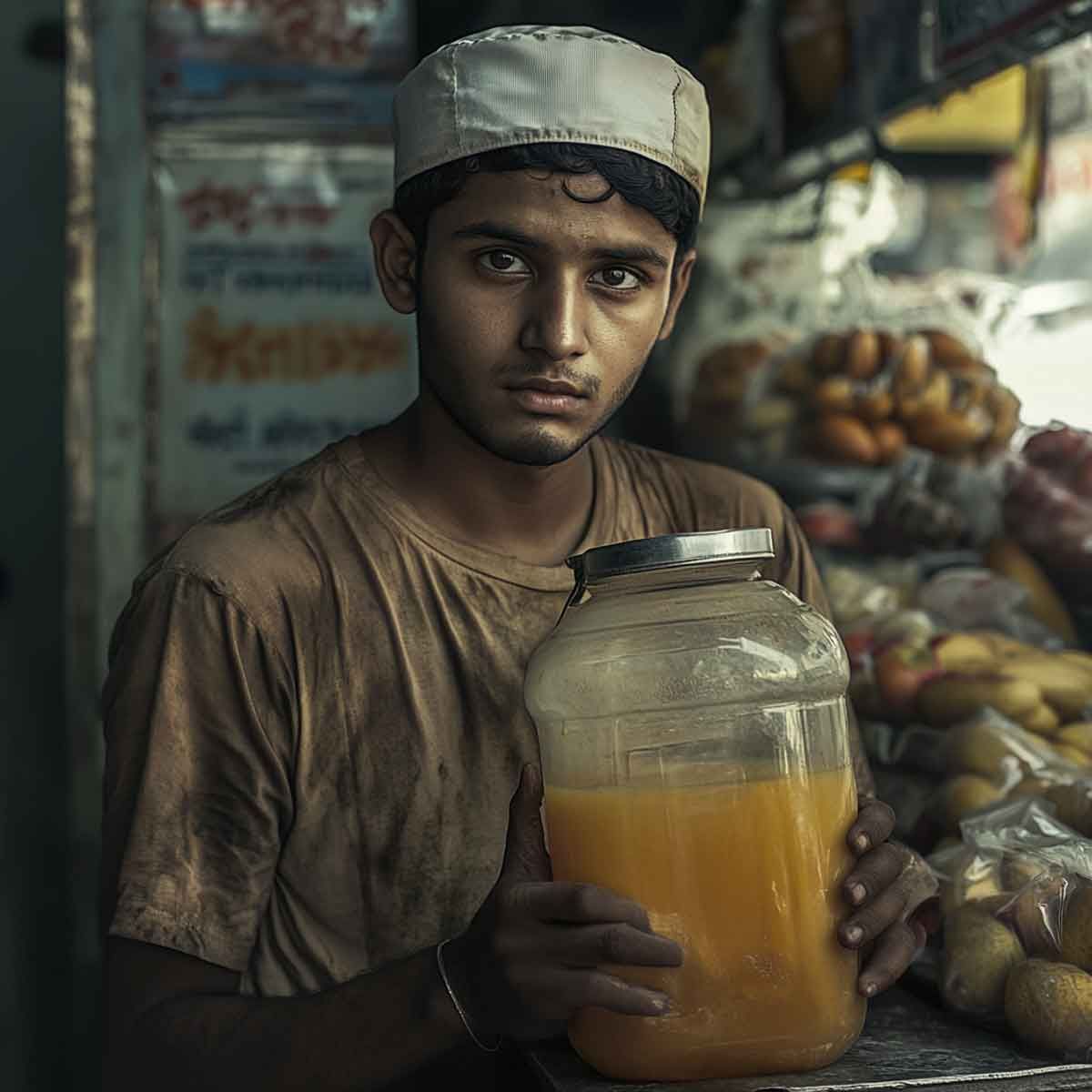MORE COVERAGE
Twitter Coverage
Satyaagrah
Written on
Satyaagrah
Written on
Satyaagrah
Written on
Satyaagrah
Written on
Satyaagrah
Written on
JOIN SATYAAGRAH SOCIAL MEDIA
"ज़लालत": Aamir Khan, a Muslim juice seller in Ghaziabad caught mixing his urine into juice sold to Hindus, sparking outrage and questioning the Supreme Court's decision to stay Yogi Adityanath’s order mandating shop name transparency to protect Sanatanis

In a disturbing and revolting incident that has sent shockwaves through Ghaziabad’s Loni Border area, Aamir Khan, the owner of Khushi Juice Corner, was found engaging in a heinous act that has left the community in outrage. Khan, along with his minor assistant, was caught by locals for allegedly mixing urine into juice sold to unsuspecting customers. As a result of these alarming allegations, the two were severely beaten by the furious crowd before being handed over to the authorities.
|
|
|
Upon receiving a tip-off from concerned residents, the local police swiftly arrived at the scene. According to reports, ACP Bhaskar Verma confirmed that the police intervention occurred just in time, as the two suspects, Aamir Khan (alias Shazid Khan) and his young assistant, were on the verge of being subjected to further violence from the mob. The officers took both into custody, preventing further escalation, and detained them for questioning. The involvement of a minor in this shocking episode has only fueled public anger and unease, stirring conversations across the region about the extent of the depravity behind this incident.
The police launched an investigation immediately after receiving the initial complaint on 13 September. They conducted a thorough search of the shop, located under the jurisdiction of Indira Police Station, where they discovered a particularly incriminating piece of evidence: a one-litre can filled with human urine. This discovery validated the accusations made by the locals. However, when questioned about the presence of such a repulsive item, the shopkeeper, Aamir Khan, failed to provide a satisfactory explanation. His inability to justify the presence of human waste in a place meant for serving drinks to customers has only worsened the community's anger towards him.
Consequently, the police wasted no time in arresting Aamir Khan and taking his minor helper into custody. An FIR has been registered in connection to this horrifying case, and the investigation is ongoing. The urine-filled can found at the scene has been sent for detailed analysis to further solidify the case against the accused.
As more details of the case unfolded, it emerged that the local residents themselves had caught Aamir Khan in the act of mixing urine into the juice. The angry crowd did not hesitate to confront him, leading to the violent altercation that ensued. As public fury boiled over, many of the locals captured the incident on their mobile phones, and the videos of the confrontation have since gone viral across social media platforms. In these clips, enraged citizens can be seen delivering a brutal beating to both the shop owner and his assistant. The identity of the minor involved has been protected for legal reasons, though the names of both accused have been widely circulated online by social media users, igniting further outrage. The fact that both accused individuals belong to the same community has sparked even more debate and raised tensions in the local area.
As more information emerges about the disturbing incident in Ghaziabad’s Loni Border area, locals continue to express their shock and anger over the actions of Aamir Khan, the owner of Khushi Juice Corner, who was caught mixing urine with the juice he sold to customers. In an interview with Times Now Navbharat, a local elder, referred to as "uncle," confirmed that they caught Aamir Khan red-handed, mixing urine into the juice. According to the uncle, the bottle slipped from Aamir’s hand in shock, and after some initial pressure, he admitted to mixing 20ml of his own urine into each glass of juice. The motive behind this grotesque act? Aamir shockingly confessed that he did it to add a spicy and sour flavor to the juice.
The uncle, clearly disgusted, remarked that although Aamir’s actions were deeply wrong, he is not the mastermind behind this vile practice. He claimed that Aamir is merely a servant, suggesting that the real mastermind is the owner of the juice shop, a person who allegedly runs five to six similar shops in the area. According to the uncle’s statements, these workers, including Aamir, might be receiving a meager ₹15,000 to ₹20,000 for carrying out such acts. This revelation has only deepened the sense of betrayal and horror among the locals.
Another local youth provided further testimony, adding that a customer visiting the shop for juice had observed Aamir urinating in a bottle. When the customer caught Aamir in the act, he confronted him, and after slapping him, Aamir confessed that he mixes his urine into the juice to enhance its flavor. This confession was made not only to the locals but was also confirmed in front of the police, leaving no doubt about the heinous act. Following this confession, Aamir Khan was arrested and sent to jail, with authorities conducting a deeper investigation into the matter.
Adding to the public outrage, another local uncle recalled an incident that occurred when he visited Khushi Juice Corner a few months back. As he was about to pay for his juice via Paytm, he discovered that Aamir Khan was Muslim, which led him to question the shop’s Hindu-sounding name. When the uncle confronted Aamir about the mismatch between his religion and the name of the shop, Aamir casually replied that “these things don’t matter,” dismissing the concern entirely. This statement has sparked debates about the deceptive naming of shops, leading to more scrutiny from the local community.
A local resident shared another alarming fact, highlighting that the area has a large population of young people, many of whom are health-conscious individuals who frequent gyms and seek out healthy food options. Khushi Juice Corner had become a popular spot, attracting groups of people due to its unique flavor and taste, which, as it turns out, was due to the unthinkable addition of urine to the beverages. The shop’s glasses were opaque, ensuring that nothing inside could be seen, and this secrecy helped maintain the shop’s popularity until the shocking revelation two days ago.
The disgust and anger within the community have reached a tipping point, with locals now visiting other four to five similar shops in the area to investigate whether similar practices are occurring. Many have raised written complaints to local officials demanding action against these establishments.
The police, meanwhile, are conducting a full investigation to uncover the motive behind this horrifying act and to determine whether more individuals or businesses are involved in this grotesque behavior. The entire area remains on edge, as locals demand justice and accountability for the betrayal of their trust.
|
Yogi Government Implemented 'Display Owners Name' Order on Food Shops Across Uttar Pradesh
Earlier this year in July, the Yogi Adityanath government in Uttar Pradesh implemented a 'display owners name' order for all food shops across the state. The move triggered controversy and intense political debates, especially along the Kanwar Yatra route in Muzaffarnagar. The directive, which required all food outlets and eateries to display the names of their owners and staff members, became a focal point for accusations of religious discrimination against certain minority communities. However, the Uttar Pradesh government proceeded with the decision, enforcing the order statewide despite these claims.
According to the official directive, food outlets, eateries, and food joints all over Uttar Pradesh had to display a "nameplate" showing the names of the owners and staff working at these establishments. The action was intended to ensure the "purity of faith" for Hindu devotees undertaking the Kanwar Yatra during the Shravan month. Since this religious pilgrimage required strict observance of rituals, the government viewed the order as a way to protect the faith of the pilgrims. The intention was to ensure that the route remained free from "unholy practices", maintaining the sanctity of the journey for the devotees.
The Kanwar Yatra is a significant annual pilgrimage where Hindu devotees adhered to strict ascetic rules. These pilgrims participated in the journey with deep religious commitment, and any potential impurity along the route was considered a direct violation of their faith. To further uphold the sanctity, the government stated that any shop found selling products with Halal certification along the Yatra route would face penal action.
In the lead-up to the event, the Muzaffarnagar police had also issued a verbal order to food establishments and joints within the city, requiring them to display the names of owners along the 240-km Kanwar Yatra route that passed through the district. This action sparked outrage, particularly among political opposition parties, who argued that the directive was an attempt to target specific communities for political gain. Many critics felt the order unfairly singled out businesses run by minorities, creating a sense of marginalization.
The Opposition quickly responded, with several leaders voicing their displeasure. The Congress Party condemned the move, calling it a "boycott" of Muslims and Dalits, and accused the government of using the order to discriminate against these groups. SP Chief Akhilesh Yadav had also demanded judicial intervention, describing the directive as a "hate-filled" order designed to inflame communal tensions. AIMIM Chief Asaduddin Owaisi even compared the situation to the apartheid of South Africa and the persecution of Jews under Hitler’s regime, drawing parallels with past instances of systemic discrimination and racial segregation.
Despite the strong backlash, the Yogi government stood by its decision, rejecting the allegations of religious discrimination and emphasizing that the order was aimed at safeguarding the "religious purity" of the Kanwar Yatra. Although the issue sparked ongoing debate, the 'display owners name' order had been enforced across Uttar Pradesh, marking a significant change in how food establishments were regulated during the important Hindu pilgrimage.
|
Milords, You Had a Choice to Eat in a Restaurant You Like, We Want the Same Choice and Clarity While Making a Purchase
In a decision that left billions of Hindus dismayed and deeply hurt, on 22nd July, the Supreme Court of India granted interim relief to petitioners challenging the directives of the Uttar Pradesh, Madhya Pradesh, and Uttarakhand governments. These directives required food shops and carts to prominently display the names of their owners. The aim was to provide transparency, especially for devotees on the Kanwar Yatra and those visiting Mahakal Temple in Ujjain, Madhya Pradesh. Despite the clear reasoning behind these measures, the Supreme Court, with the stroke of a pen, temporarily stalled the effort, much to the frustration of Hindu devotees who saw their religious sensitivities being casually dismissed.
The states of Uttar Pradesh and Uttarakhand had implemented the directives specifically for the Kanwar Yatra path, where millions of devotees follow strict religious dietary guidelines. Similarly, Madhya Pradesh’s Ujjain administration had issued the same rule for shops outside the revered Mahakal Temple, to ensure that the food consumed by the devotees adhered to their Satvik diet. Yet, in a surprising move, the Supreme Court stayed these directives, giving the impression that the religious preferences of the Hindu majority were being sidelined in favor of "equal treatment" for all, even at the cost of disregarding long-held customs.
The proceedings in court revealed an interesting detail during the argument. Justice SVN Bhatti, part of the bench that heard the case alongside Justice Hrishikesh Roy, shared a personal anecdote that left many scratching their heads. He revealed that he used to frequent a vegetarian hotel run by a Muslim over one operated by a Hindu, citing that the former maintained higher standards of hygiene. Justice Bhatti remarked, “Without disclosing the city’s name I will share it with you. In Kerala, there were two vegetarian hotels, one by Hindu and one by Muslim. I went to the latter because he was maintaining international standards. He was a Dubai returnee. But he displayed everything on the board.”
Justice Bhatti’s personal dining preference was based on the complete clarity and transparency provided by the Muslim hotelier, who displayed everything clearly on the board, allowing Bhatti to make an informed decision. Yet, this same clarity and transparency was denied to the Hindu pilgrims who, while performing the Kanwar Yatra, are bound by religious rules that require them to consume Satvik food. The irony, however, lies in the fact that Justice Bhatti, who enjoyed the freedom to choose his restaurant based on information about the operator, was part of the two-judge bench that denied this very right to the Hindu devotees performing their sacred pilgrimage.
|
The Kanwar Yatra holds significant religious importance for Hindus, and devotees must adhere to strict dietary rules during this time. Without proper information about the owners of the food establishments, these pilgrims run the risk of breaking their religious code. If Justice Bhatti can make an informed choice when selecting a hotel based on hygiene and standards, why should the Hindu devotees be denied the same opportunity to make a conscious and informed decision? The issue at hand is not just about names, but about maintaining the religious purity of the journey.
The Supreme Court’s interim stay on the state governments' directives was grounded in the argument that such orders were “discriminatory” and could foster untouchability. However, this reasoning leaves a lot to be desired. On social media, many pointed out the illogical fears being raised, suggesting that Kanwariyas might also avoid eateries run by Scheduled Castes, Scheduled Tribes, and OBCs. The question remains: where is the evidence to support these claims? Unsurprisingly, there was none. These accusations seem more like hypothetical fears designed to undermine the religious sentiments of Hindus rather than genuine concerns grounded in reality.
In essence, the Supreme Court’s decision raises a larger question about judicial priorities. While the Milords had no qualms about exercising their choice in restaurants, they have effectively deprived Hindu devotees of the same freedom. Is it too much to ask for clarity in a world where religious sensitivities are at stake? Hindus, like everyone else, deserve the right to make informed decisions about what they consume, especially when their faith and practices are involved. But apparently, for the judiciary, safeguarding Hindu sentiments does not seem to carry the same weight as upholding vague notions of "equality." The real question is: who is truly being discriminated against here?
In yet another instance where Hindu sentiments were pushed aside, Abhishek Manu Singhvi, representing the petitioners, argued that simply displaying the name of the owner cannot be considered a measure to ensure vegetarian food. According to him, any such directive, without constitutional backing, would infringe upon the secular nature of the state and violate Articles 14, 15(1), and 17 of the Constitution. These contentions were accepted by the Supreme Court, but in their acceptance, one glaring omission stood out—the basic right of Hindus to choose where they want to eat or buy products was left completely unacknowledged.
|
It is almost laughable, if it weren’t so concerning, that the judiciary, in its wisdom, failed to recognize that Hindus, like any other group, should have the right to make informed decisions about their dietary preferences. If displaying the owner's name helps them adhere to their religious beliefs—such as the consumption of Satvik food during the Kanwar Yatra—why is it suddenly unconstitutional to allow this simple act of transparency? One might even venture to suggest that this isn’t just an oversight, but a conscious act of selective sensitivity, conveniently ignoring the needs of Hindu devotees while overcompensating for perceived slights against other communities.
In an interesting twist during the discussion, Justice Bhatti made yet another revealing comment. He pointed out that “some non-vegetarians prefer Halal-certified meat,” acknowledging that food choices often depend on religious beliefs. This was particularly insightful given that Halal is a practice rooted in Sharia law, where only a Muslim butcher can ensure the meat is Halal. The Muslim community is clear and upfront about their religious dietary preferences, and they make informed choices by seeking out clearly labeled Halal meat. This is made possible because Halal meat is explicitly labeled in bold letters at shops and restaurants, leaving no room for doubt.
Justice Bhatti, in all fairness, stated, “We understand the distinction between good and bad here. Some non-vegetarians prefer Halal-certified meat.” Yet, despite this understanding, the same judges saw no merit in extending the right to transparency to Hindu pilgrims. If Muslims can make informed decisions about Halal meat based on clear labeling, why can’t Hindu devotees have the same right to choose where they purchase food, especially when their religious practices are at stake? The hypocrisy is too blatant to ignore.
Moreover, Halal meat has become so widely available that it has become the default choice in many popular food chains. This leaves Hindus and Sikhs, who prefer Jhatka meat, in a difficult position. They often have to go out of their way to ask whether the meat being served is Jhatka, as it is not clearly labeled. It is common knowledge that Halal meat can only be butchered by a Muslim, and this has led to an alarming loss of employment opportunities for Hindu and Sikh butchers. Yet, this issue is rarely, if ever, questioned or debated in public forums or courts. It appears that while the majority Hindu population faces these challenges in silence, their concerns remain largely unaddressed by the very institutions that are supposed to protect their rights.
|
It is worth noting that Hindus are the majority in India, and the number of meat-eating Hindus far exceeds that of Muslims. Yet, through either intentional or unintentional neglect, Hindus are forced to consume Halal meat in many cases, without their knowledge or consent. In this scenario, the question arises—what about the rights of Hindus? Are their religious dietary preferences not important enough to be safeguarded by the courts? If Halal meat is openly available and prominently labeled for the benefit of Muslims, why are Hindus denied the same level of transparency and choice?
As the saying goes, one needs two hands to clap, but it appears the Supreme Court only heard one side of the story, leaving the concerns of Hindus neglected. When it comes to dietary habits and food choices, the rules cannot be imposed in a biased manner, favoring only one community while completely sidelining the other. Hindus must be given the right to choose not only where they eat but also from whom they buy their food—whether it be fruits, vegetables, or other items. This decision should be made based on publicly available information, preferably prominently displayed on boards outside shops and carts. Why is this right to transparency being denied to Hindu devotees, especially those on religious pilgrimages like the Kanwar Yatra, who have strict dietary rules to follow?
The Supreme Court’s order brought up another aspect worth noting. The court pointed out that a competent food authority should have issued the directive concerning the display of names outside shops. The court stated, “It is permissible for the authorities to ensure that the Kanwariyas are served vegetarian food conforming to the preferences and also ensure hygienic standards.” The court further suggested that the competent authority could issue such directives under existing laws, such as the Food Safety and Standards Act, 2006 and the Street Vendors Act, 2014. However, the legal powers given to these authorities cannot be usurped by the police without a proper legal foundation.
In essence, the Supreme Court implied that if the FSSAI (Food Safety and Standards Authority of India) were to issue a directive requiring shops and vendors to prominently display the names of owners and workers, there would likely be no objection. But here lies the irony: while the court accepts the possibility of such directives being valid if issued by a food authority, it conveniently ignores the fact that this simple act of transparency is what the Hindu devotees were asking for in the first place. Why must the Kanwariyas, who are following their religious customs, go through this legal maze when their request is as simple as knowing where their food is coming from?
|
|
What’s even more disheartening is that during the Supreme Court proceedings, there was no one from the governments of Uttar Pradesh, Madhya Pradesh, or Uttarakhand to represent the matter. This absence, despite all three governments having counsels on payroll in the apex court, sends a troubling message. The next hearing in the matter is scheduled for 26th July, but one wonders—will the governments finally step up to defend the rights of their Hindu citizens, or will this matter continue to be conveniently ignored?
If one community can be granted the right to choose based on clear labeling, then why should the same privilege be denied to another community? The judiciary, tasked with upholding fairness and justice, seems to be doing quite the opposite. The court may have suggested that the FSSAI should handle the matter, but this is nothing more than an elegant way of sidestepping the real issue—the right of Hindus to make informed choices in accordance with their religious beliefs. Should the Supreme Court really need a food authority to tell them that clarity and transparency are basic rights that should apply to everyone?
It seems that Hindus, despite being the majority in India, are still denied basic rights that others take for granted. Whether it’s the issue of Halal meat being widely available, forcing Hindus to ask about the nature of the food they consume, or now the Kanwariyas being denied clear information about the shops they patronize, the same pattern of neglect continues. And while the next hearing may offer a glimmer of hope, one cannot help but question whether Hindu sentiments will ever be given the respect and consideration they deserve.
Now, the pressing question remains: Will the Supreme Court acknowledge the consequences of its own order, which has indirectly contributed to situations where Hindus are forced to consume tainted products, such as urine mixed in juice? By staying the order requiring the display of owners' names, has the judiciary unintentionally opened the door to deceitful practices that violate Hindu religious customs? If Muslims can have Halal meat clearly labeled, why are Hindus denied the same level of transparency when it comes to their dietary needs?
Why is it that Hindu devotees, bound by their religious principles, are left vulnerable to unscrupulous food practices during their sacred pilgrimages? Are their religious rights not important enough to merit the same protection given to other communities? Shouldn’t transparency be a fundamental right for all, especially in a country where Hindus form the majority? And if the Supreme Court finds it reasonable for food authorities to ensure hygienic standards and clear labeling, why hasn’t this simple right been extended to the millions of Hindu pilgrims?
Is the judiciary’s selective enforcement of rights further marginalizing Hindu religious practices? Or will the court take responsibility for the unintended consequences of its decisions, ensuring that Hindu sentiments are respected and their religious dietary practices are safeguarded just as vigorously as those of other communities?
 |
 Support Us
Support Us
Satyagraha was born from the heart of our land, with an undying aim to unveil the true essence of Bharat. It seeks to illuminate the hidden tales of our valiant freedom fighters and the rich chronicles that haven't yet sung their complete melody in the mainstream.
While platforms like NDTV and 'The Wire' effortlessly garner funds under the banner of safeguarding democracy, we at Satyagraha walk a different path. Our strength and resonance come from you. In this journey to weave a stronger Bharat, every little contribution amplifies our voice. Let's come together, contribute as you can, and champion the true spirit of our nation.
 |  |  |
| ICICI Bank of Satyaagrah | Razorpay Bank of Satyaagrah | PayPal Bank of Satyaagrah - For International Payments |
If all above doesn't work, then try the LINK below:
Please share the article on other platforms
DISCLAIMER: The author is solely responsible for the views expressed in this article. The author carries the responsibility for citing and/or licensing of images utilized within the text. The website also frequently uses non-commercial images for representational purposes only in line with the article. We are not responsible for the authenticity of such images. If some images have a copyright issue, we request the person/entity to contact us at This email address is being protected from spambots. You need JavaScript enabled to view it. and we will take the necessary actions to resolve the issue.
Related Articles
- "मंज़िल-ए-इश्क़": In Bareilly, 15-year-old Lakshmi brutally murdered by Farihad Hussain after being raped and forcibly converted to Islam in a mosque; her dismembered body found near railway tracks, sparking protests, family blame severe police negligence
- "इस्लाम": A widow in Lakhimpur Kheri’s Basaha Mafi, harassed by Muslim men who stole ₹35K, kidnapped her elder daughter, assaulted her younger one, and issued threats, is selling her house to escape fear in a Muslim-majority village despite FIRs & arrests
- From changing Muslim identity for luring Hindu girls to black magic, mysterious water in dargahs and sexual exploitation: Grooming jihad horrors from the back of beyond of Gujarat
- Rampur’s royal family finally repossess waqf properties ‘encroached’ by imprisoned Samajwadi Party MP Azam Khan after a thorough investigation by the Uttar Pradesh Shia Central Waqf Board
- Violence Against Minority Hindus in Bangladesh: The Mistier World Of Silence
- The ‘Sanghi propaganda’ trope on abduction and conversion of Sikh girls to Islam. Here is how this online tirade is an omen of impending danger
- Bizarre argument by Alt News in defense of Muslim man ‘spitting on food’ in viral video
- Tipu Sultan remembered as killer of Brahmins and demolisher of temples in many villages of Tamil Nadu: a freedom fighter or Islamic bigot?
- Google removes ‘Ghazwa e Hind’ app from play store after uproar
- In yet another horrific incident of grooming jihad Mohammad Yasin, a supplier of ayurvedic medicine killed his second wife ‘Zara’ earlier a Hindu girl 'Shiva Vishwakarma': Left their three-year-old girl child outside the house
- Due to ASI negligence Muslim encroachers squat on ancient Raja Yayati Fort in Kanpur
- "कुरान की कसम तुझे मार दूँगा": After a heated argument escalated post-Jumma, a 12-year-old student in a UP madrasa used a pillow to smother Mohammad Ayan's screams and fatally stabbed him in the neck, fulfilling a threat made on the Quran
- UP CM Yogi Adityanath Govt forbade Namaz on the roads or public places on Alvida Juma, the last Friday of Ramzan: Religious leaders appeal to Muslims to limit themselves to mosques
- Photos of dozens of Hindu girls found circled in a house illegally occupied by Bangladeshi Rohingyas and converted into a mosque in Bilaspur; according to reports, a Hindu activist team discovered the mosque while searching for a missing minor Hindu girl
- ‘माँ-बाप सहित काट कर फेंक दूँगा’: Armaan Ansari arrested for abducting and brutally raping a Dalit LLB student in Ghazipur, issuing death threats and revealing his disturbing history with multiple criminal charges including robbery and murder attempts



























